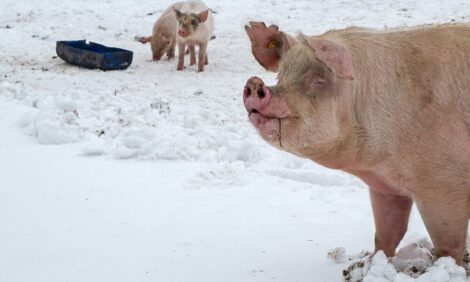



Producers can guard against ileitis, naturally
US - When it comes to keeping pigs healthy, swine producers may feel like the watchdog of their operation as they have a number of diseases to beware of in their confinement systems: porcine respiratory reproductive syndrome, influenza, salmonella, dysentery and porcine stress syndrome are just a few to name.Studies estimate that ileitis, also known as Proliferative Enteropathy (PE), can cost the pork industry close to $98 million dollars a year in direct and indirect costs. Symptoms include diarrhea and variation in the weights of growing pigs.
“PE can cause adverse effects on feed conversion, weight gain and fecal quality,” says Dr. Kyle Newman of Venture Laboratories in Lexington, Kentucky.
As the laboratory director at Venture Laboratories, Newman heads a team of scientists with research projects on microbial ecology of the gastrointestinal tract, pathogen control, adhesions and glycomics.
Even though a pig may not show clinical signs of ileitis, it often tests positive for the bacteria that cause it. A serological survey conducted by the National Animal Health Monitoring System in 2000 found that 96.2 percent of tested United States herds were positive for Lawsonia intracellularis, while 37 percent were clinically infected.
“There appears to be synergistic activity of Lawsonia with other intestinal organisms,” Newman says. “Gnotobiotic pigs did not develop ileitis when dosed with the organism unless the pigs were previously dosed with porcine intestinal bacteria.”
Research has also shown that normal intestinal organisms produce the proper conditions in the gastrointestinal tract necessary for Lawsonia to proliferate. E.coli, Clostridia and Bacteroides species have been proposed to play a role in stirring up the disease.
Hygiene
Although the causes and contributing factors are not totally understood, studies conclude that ileitis can be triggered or rapidly spread by overcrowded units, on-farm movement between stages of production, mixing or regrouping of swine, changes in diet formulations and environmental changes such as temperature or humidity fluctuations. The swine facility design and sanitation may also increase exposure to the organism and infected animals.
Since the fulfilment of Kochs’ postulates in 1993, proving that Lawsonia is involved with the disease, and the identification of the antibiotic sensitivity of the organism in 1995, current research for ileitis has focused on combining new diagnostic tools with targeted medication programs, developing vaccines and gathering information necessary for potential eradication programs.
Research is still underway on eradication programs for the disease. Studies show Lawsonia infection may persist in some pigs for at least 10 weeks, with numerous organisms being passed in the feces. While producers have been active in targeted medication programs and vaccinations, full attention has not been given to eradication. Keeping pens cleaned and rested for two weeks while ensuring incoming pigs are free of infection are some steps to creating an eradication program.
Medication alternatives
In terms of vaccines and antibiotics, one US company has recently developed an avirulent isolate of Lawsonia intracellularis using a patented method of cultivation and attenuation. Broad continuous medication programs are no longer recommended. Recent experimental studies have indicated that continuous medication, particularly at high doses during the grower period, tends to reduce the level of immunity to PE and make the animals more susceptible to getting it again. The efficient use of targeted medication programs relies on knowledge of prior PE outbreaks on farms. An efficient program should examine the time of the "break" of infection on farms and combine that with a targeted medication program, just after the occurrence of infection.
While prophylactic antibiotic use has been documented in several studies to reduce the incidence of ileitis, some swine producers are looking for other options to maintain GI health in their operations. According to Newman, some swine producers are turning to the use of specific yeast products. These products help tackle gut intruders like bad bacteria and support the overall gut health of the animal. Newman has used a yeast product and says it has been shown to modulate immune function which could aid the animal in fighting a Lawsonia infection. "It has been shown to improve gut mucus which could aid in preventing the Lawsonia infection from reaching enterocytes.”
Source: Farms.com






